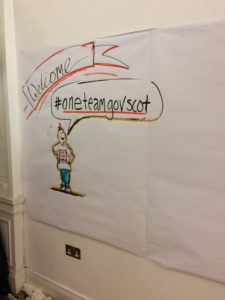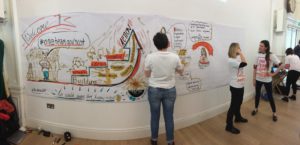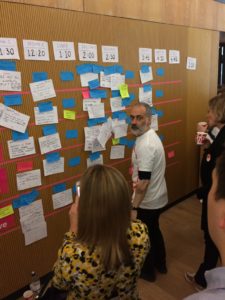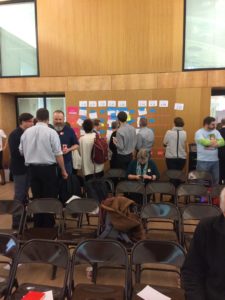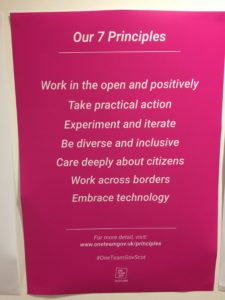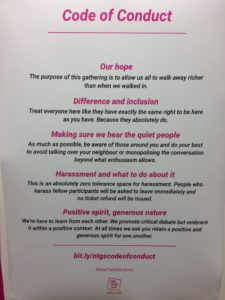Reaching out across the public sector: #OneTeamGov
Last week I took part in my first ‘unconference’, the inaugural get together of OneTeamGov Scotland. People from across the public sector and third sector getting together to share the joys and challenges of building better services.
I met some great people, joined lively and diverse discussions, heard some inspiring speakers and now have some interesting chats to follow up on.
The event was held in Edinburgh, and brought together a diverse range of service designers, UX professionals, content specialists, data managers and a load of other specialist professions from across government, charities and other areas of the third sector.
The thing that united all these people with a such a wide range of backgrounds and disciplines was very simple: a desire to make better services for their users / citizens / students / customers.
So this wasn’t just a digital thing. It was a people thing.
I was particularly struck by a quote used in one of the opening lightning talks:
“This is really about service transformation enabled by digital, not digital transformation”
Sarah Prag
This, to me, gets to the heart of what the University is trying to achieve at the moment through its Service Excellence and Digital Transformation Initiatives. We must never lose sight of what we’re working towards: better services that meet user needs and add value to the business.
The format of bringing people together from a range of disciplines to discuss, share and contribute is something I think we could do really well at the University, given the opportunity. We need to make two way (or many ways?) conversation the default format rather than the requirements gathering special event, supplemented with one-way dissemination of project updates.
This is something I’ve been trying to facilitate through our UX Programme Showcase sessions to both publicise the work I’m leading to support the Digital Transformation Initiative, and to enable attendees to shape our provision.
Read more about our UX Showcase sessions
Speakers
The day was kicked off by a series of lightning talks which set the scene for the rest of the day:
- Katy McNeil: What is policy?
- Ross McCulloch: Doing better with digital
- Sarah Drummond: What is service design?
As the speakers gave their lightning talks, someone was doing a fantastic job of sketch noting on a massive scale right under the presentation screen.
After the lightning talks, the majority of the rest of the day was given over to a series of parallel workshop sessions using the ‘unconference’ approach to set the agenda.
Unconference format
The ‘unconference’ that followed was a very simple, but effective format.
Everyone was invited to write a short ‘provocation’ and spend up to 30 seconds presenting it to the room. Essentially, this was a pitch for the focus of a session; something the person cared about whether because they had stuff to share or it was something they wanted to learn.
OneTeamGovScot organiser Sarah Drummond talks about provocations in this post on Medium<
These provocations were then taken by members of the organisational team and grouped/labelled/scheduled into what became the format for the rest of the day.
I’m sure this was a challenging and slightly stressful experience for them, but they certainly seemed to create a coherent schedule out of everyone’s ideas and pitches.
We then had a multi-track series of workshop and discussion groups to fill the agenda for the rest of the day.
My session on staff recruitment, retention and progression
I chaired a session on recruitment, retention and progression of staff as I’m particularly interested in how we develop more UX-related roles in the University, bring new skills and perspectives in, and empower existing colleagues to develop and progress beyond existing roles.
It was quite a large group, so rather than try and chair a 45 minute meandering discussion, I took the Lean Coffee approach and got the group to set the agenda. We grouped and labelled our ideas for discussion topics, then voted. Three related topics came out on top and this then steered our conversation for the remainder of our time.
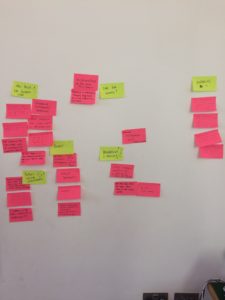
We collaboratively grouped and labelled the topics we all wanted to discuss, following the Lean Coffee approach.
The background of the group was broader than I’d anticipated, so the conversation went in other directions, but nevertheless it was interesting to hear about the challenges other specialisms face in this area. There were lots of similar experiences and some great ideas and perspectives that provided lots of food for thought.
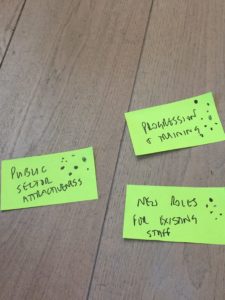
The agenda for the discussion that we prioritised as a group. This gave me the direction needed for me in chairing the session.
The future?
This was the first One Team Gov event in Scotland, following on the heels of the first session run down south through the Government Digital Service.
It undoubtably happened through the energy and vision of a small number of enthusiastic people, and the sponsorship of their managers and organisations. But I think that’s pretty true of any community event that doesn’t have some kind of underlying money-making agenda. We see that in-house all the time with communities of practice like the well-established web publishers group and the newer arrivals like the front-end developers.
I personally felt that while the unconference format was good (I’ll definitely make use of it myself in future) it was perhaps a bit of a stretch to fill a whole day this way. And in some sessions I joined, the range of backgrounds was a little too broad to have the most rewarding of conversations.
But having said that, I did have really useful conversations, collected a few insights and ideas to try out in-house, and made a couple of contacts to follow up with in the coming months on areas of mutual interest.
Find out more
Slides from the introduction and lightning talks that kicked off the day
Twitter feed for #OneTeamGovScot which includes lots of coverage of the day
More about the unconference format (on Medium.com)
Get in touch
If I’ve inspired you with all my enthusiasm for OneTeamGov and the unconference format, get in touch. I’d love to explore ways in which we could bring this kind of thing into the University.


